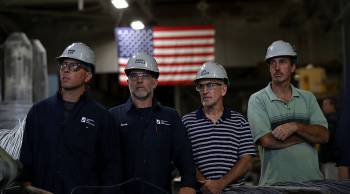There’s a provision in the $787 billion stimulus bill that requires all the iron, steel and manufactured goods purchased for public works projects to be made in the United States. The Democrats’ intent here was obviously to defend American jobs. It might be doing just the opposite.
From a New York Times editorial:
Foreign and domestic companies that employ hundreds of workers in this country cannot bid for government projects because they cannot guarantee the American provenance of all the steel, iron and manufactured goods in their supply chain, as the provision requires. Others are scrambling to figure out whether American-made alternatives exist to replace their foreign inputs.
The steel company Duferco Farrell, for example, has cut about 600 jobs in Pennsylvania after it lost orders from its biggest customer because some of its goods are partly produced abroad.
Duferco’s executive vice president puts it like this (in the Washington Post):
“You need to tell me how inhibiting business between two companies located one mile apart is going to save American jobs. I’ve got 600 United Steel Workers out there who are going to lose their jobs because of this. And you tell me this is good for America?”
Other countries have been raising a stink about the provision too — so much so, that President Obama convinced Congress to add a clause to Buy American that promised the US would still meet its international obligations. But that isn’t stopping cities and states from implementing their own Buy American edicts. The mayor of Peru, Indiana says:
“You’re trying to get America turned around, trying to put Americans back to work,” Walker said. “And if American taxpayers are paying for this, well then, Americans deserve the benefits.”
It’s hard to argue with that, but it’s part of a growing protectionist attitude at a time when protectionism might be exactly the wrong approach. The Times says 12 Canadian cities have now passed ordinances against buying American. Others might follow.
What will saving a few thousand jobs accomplish if exports go in the tank, and that costs the US economy tens of thousands of jobs? It doesn’t make sense. Having incentives for companies to buy American is one thing. Mandating it is quite another, and in a global recession, it might just be fairly self-destructive.
There’s a lot happening in the world. Through it all, Marketplace is here for you.
You rely on Marketplace to break down the world’s events and tell you how it affects you in a fact-based, approachable way. We rely on your financial support to keep making that possible.
Your donation today powers the independent journalism that you rely on. For just $5/month, you can help sustain Marketplace so we can keep reporting on the things that matter to you.


















